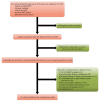Mobile-Health Applications for the Efficient Delivery of Health Care Facility to People with Dementia (PwD) and Support to Their Carers: A Survey
- PMID: 31032361
- PMCID: PMC6457307
- DOI: 10.1155/2019/7151475
Mobile-Health Applications for the Efficient Delivery of Health Care Facility to People with Dementia (PwD) and Support to Their Carers: A Survey
Abstract
Dementia directly influences the quality of life of a person suffering from this chronic illness. The caregivers or carers of dementia people provide critical support to them but are subject to negative health outcomes because of burden and stress. The intervention of mobile health (mHealth) has become a fast-growing assistive technology (AT) in therapeutic treatment of individuals with chronic illness. The purpose of this comprehensive study is to identify, appraise, and synthesize the existing evidence on the use of mHealth applications (apps) as a healthcare resource for people with dementia and their caregivers. A review of both peer-reviewed and full-text literature was undertaken across five (05) electronic databases for checking the articles published during the last five years (between 2014 and 2018). Out of 6195 searches yielded articles, 17 were quantified according to inclusion and exclusion criteria. The included studies distinguish between five categories, viz., (1) cognitive training and daily living, (2) screening, (3) health and safety monitoring, (4) leisure and socialization, and (5) navigation. Furthermore, two most popular commercial app stores, i.e., Google Play Store and Apple App Store, were searched for finding mHealth based dementia apps for PwD and their caregivers. Initial search generated 356 apps with thirty-five (35) meeting the defined inclusion and exclusion criteria. After shortlisting of mobile applications, it is observed that these existing apps generally addressed different dementia specific aspects overlying with the identified categories in research articles. The comprehensive study concluded that mobile health apps appear as feasible AT intervention for PwD and their carers irrespective of limited available research, but these apps have potential to provide different resources and strategies to help this community.
Figures
Similar articles
-
A comprehensive study of mobile-health based assistive technology for the healthcare of dementia and Alzheimer's disease (AD).Health Care Manag Sci. 2020 Jun;23(2):287-309. doi: 10.1007/s10729-019-09486-0. Epub 2019 Jun 20. Health Care Manag Sci. 2020. PMID: 31218511 Review.
-
Factors Associated With Intention to Adopt mHealth Apps Among Dementia Caregivers With a Chronic Condition: Cross-sectional, Correlational Study.JMIR Mhealth Uhealth. 2021 Aug 31;9(8):e27926. doi: 10.2196/27926. JMIR Mhealth Uhealth. 2021. PMID: 34463637 Free PMC article.
-
mHealth Apps for Dementia Caregivers: Systematic Examination of Mobile Apps.JMIR Aging. 2024 Nov 20;7:e58517. doi: 10.2196/58517. JMIR Aging. 2024. PMID: 39621936 Free PMC article.
-
Quality of Mobile Apps for Care Partners of People With Alzheimer Disease and Related Dementias: Mobile App Rating Scale Evaluation.JMIR Mhealth Uhealth. 2022 Mar 29;10(3):e33863. doi: 10.2196/33863. JMIR Mhealth Uhealth. 2022. PMID: 35348467 Free PMC article.
-
Mobile apps for dementia awareness, support, and prevention - review and evaluation.Disabil Rehabil. 2022 Aug;44(17):4909-4920. doi: 10.1080/09638288.2021.1914755. Epub 2021 May 25. Disabil Rehabil. 2022. PMID: 34034601 Review.
Cited by
-
Deep learning-based image quality improvement for low-dose computed tomography simulation in radiation therapy.J Med Imaging (Bellingham). 2019 Oct;6(4):043504. doi: 10.1117/1.JMI.6.4.043504. Epub 2019 Oct 24. J Med Imaging (Bellingham). 2019. PMID: 31673567 Free PMC article.
-
Pilot RCT examining feasibility and disability outcomes of a mobile health platform for strategy training in inpatient stroke rehabilitation (iADAPT).Top Stroke Rehabil. 2023 Jul;30(5):512-521. doi: 10.1080/10749357.2022.2077522. Epub 2022 May 18. Top Stroke Rehabil. 2023. PMID: 35583268 Free PMC article. Clinical Trial.
-
Mobile phone apps for family caregivers: A scoping review and qualitative content analysis.Digit Health. 2022 Feb 8;8:20552076221076672. doi: 10.1177/20552076221076672. eCollection 2022 Jan-Dec. Digit Health. 2022. PMID: 35154806 Free PMC article.
-
Assistive Technologies in Dementia Care: An Updated Analysis of the Literature.Front Psychol. 2021 Mar 24;12:644587. doi: 10.3389/fpsyg.2021.644587. eCollection 2021. Front Psychol. 2021. PMID: 33841281 Free PMC article.
-
Can Technology Abate the Experience of Social Isolation for Those Affected by Dementia?Front Aging Neurosci. 2022 Feb 22;13:779031. doi: 10.3389/fnagi.2021.779031. eCollection 2021. Front Aging Neurosci. 2022. PMID: 35281719 Free PMC article.
References
-
- Jack C. R., Jr., Albert M. S., Knopman D. S., et al. Introduction to the recommendations from the National Institute on Aging-Alzheimer's Association workgroups on diagnostic guidelines for Alzheimer's disease. Alzheimer's and Dementia. 2011;7(3):257–262. doi: 10.1016/j.jalz.2011.03.004. - DOI - PMC - PubMed
Publication types
MeSH terms
LinkOut - more resources
Full Text Sources
Medical




